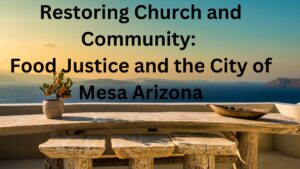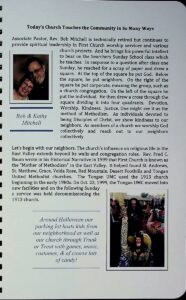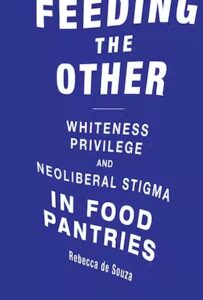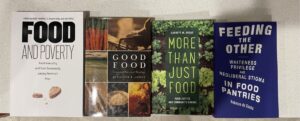First United Methodist Church of Mesa (FUMC) is a located in the downtown area of Mesa, AZ, which is a city that is experiencing a new time of growth and refurbishment after a period of depression. During this rebuilding, the city of Mesa has become a center for the Arts and artists, as well as a home for local small businesses, like craft breweries and mom and pop restaurants. However, the new growth of the city has not been without hardship for some in the community and for the church itself. Gentrification has placed many of the most vulnerable in Mesa without adequate access to food resource and/or into the homeless population. Many of whom, live “across the tracks,” behind the church, just outside the downtown area. At the same time, FUMC faces the challenges of growth and reconnection to the community after a time of decline. FUMC can address the challenges of food insecurity and reconnection to the city by living into the United Methodist theology of social justice to build community and create a place of transformation. The fact that the word mesa means table in English isn’t lost here, perhaps a ministry to address the needs of the community should begin at the table. A wholistic food justice ministry that invites our “neighbors” into “communion” will be an act of FUMC’s lived theology that can restore both church and community. Church revitalization and food insecurity have been focal points of my life since beginning in ministry, so I feel deeply called to this type of work.
“A wholistic food justice ministry that invites our “neighbors” into “communion” will be an act of FUMC’s lived theology that can restore both church and community”
Friends@First
I was appointed to FUMC in July of 2019, just 9 months before the COVID-19 global pandemic shut down the world. I arrived with the intention of revitalizing the church by evaluating its connection to its stated mission, vision, and core values, as well as its connection to the community of downtown Mesa. Working with a small team of individuals, we began to research the needs of the community. Using demographic studies, walk around observations, church historical documents, small group sessions, and personal interviews, I began to understand that one of the greatest needs for Mesa is food security. One ministry idea that surfaced that could create an expression of our shared values was a food and clothing pantry, so we started Friends@First ministry.
Friends@First was constructed by using the Asset-Based Community Development Process (ABCD). In this process I sought to understand five assets within the community:
- Contributions of Residents: The gifts, skills and passions and knowledge of residents, which are contributed towards the collective wellbeing of their community.
- Associations are clubs, groups, and networks of unpaid citizens, who create the vision and implement the actions required to make their vision, visible, and of consequence.
- Local Institutions, whether for profit, non-profit/non-governmental organizations (NGOs) or governmental show up in the civic realm in one of two ways: institutionally or community oriented.
- Organizing their support the way people organize their lives: small and local;
- by putting institutional assets at the service of community building efforts and investing in community alternatives to their traditional ways of working;
- being clear about what they are going to do to/for/with communities, because to do so would be to take power from the people they serve;
- in the case of government institutions, the create a dome of protection against outside forces that could harm community life.
- Local Places: The main stage on which the above three human resources are revealed, connected and brough into productive collective action, is the built and natural environment.
- Exchange: In the non-monetary world, there are three forms of exchange: 1) the exchange of intangibles, 2) the exchange of tangibles, and 3) use of alternative currencies. In the commercial world 4) there is a fourth form of exchange in the shape of money.[1]
Using this community-based asset tool I was able to identify the needs of the community and some of the key leaders, organizations, and places that should be involved in the conversation. The ABCD process has become a vital piece to the creation of this ministry because it offers an invitation for the community to be involved in resolving the challenges that are faced, while also giving voice to those who are usually marginalized. In the case of Friends@First food pantry and outreach ministry, I interviewed members of the church, spoke with members of the community experiencing homelessness, engaged those experiencing food insecurity, families on the margins, local government, local churches, small businesses, help organization, and community organizing groups.
“The ABCD process has become a vital piece to the creation of this ministry because it offers an invitation for the community to be involved in resolving the challenges that are faced, while also giving voice to those who are usually marginalized.”
Homelessness and Food Insecurity in the City of Mesa
The city of Mesa Arizona is a “food desert.” As noted by the USDA, “Commonly referred to as “food deserts,” these regions of the country often feature large proportions of households with low incomes, inadequate access to transportation, and a limited number of food retailers providing fresh produce and healthy groceries for affordable prices.”[2] As the city begins to emerge from a time of decline, there has not been enough attention focused on access to food resources, and with the growing number of unhoused persons in the city, food insecurity is becoming a major social justice concern for the city.
An article posted in the East Valley Tribune in December of 2018 notes that, “As many as 3,200 homeless people live in Mesa, according to the Homeless Management Information System, a national database used by the U.S. Department of Housing and Urban Development.”[3] This number does not reflect the increase in homelessness since 2018 or the impact of the COVID-19 pandemic. In 2019 the number of homeless in Maricopa County, where Mesa resides, was 42,999 an estimated 1% of the population of 4, 410, 824.[4] This is a significant number of individuals and families that are in desperate need of assistance from not-for-profit organizations and faith communities.
Holy Communion – Eucharistic Theology
The United Methodist theology of Holy Communion is rooted in the New Testament where there are at least 6 major ideas present: thanksgiving, fellowship, remembrance, sacrifice, action of the Holy Spirit, and eschatology.[5] This Holy Mystery: A United Methodist Understanding of Holy Communion, a publication by The General board of Discipleship of The United Methodist Church highlights “The early Christians “broke bread in their homes and ate together with glad and sincere hearts, praising God and enjoying the favor of all people””[6] (Acts 2:46-47a, NIV). The Holy Communion is Eucharistic, an act of thanksgiving.
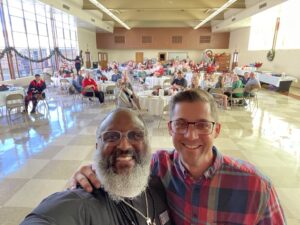
Rev. Khalif Smith (FUMC) and bishop Justin Miller (Olive Ward, LDS church) share a community meal after collaborating on a food and clothing drive to support the Friends@First Ministry.
The idea of sharing a meal as an act of thanksgiving to God, in fellowship with community, with remembrance for God’s acts among us, reflecting upon the sacrifice of Jesus the Christ, empowered by the Holy Spirit and focused upon God’s eschatological outcomes, is an act of “Holy Communion.” Based upon this theological foundation, our service to the needs of the community in food ministry are acts of Holy Communion which can transform both church and community. “In the midst of the personal and systemic brokenness in which we live, we yearn for everlasting fellowship with Christ and ultimate fulfillment of the divine plan. Nourished by sacramental grace, we strive to be formed into the image of Christ and to be made instruments for transformation in the world.”[7] This is one of the foundational theological elements that should be adopted by all food ministries. As we serve the Mesa community, we are attending to “communion,” and thereby participating in God’s holy acts of grace and activism in the world.
“The non-profit organization can bring into “communion” the multitude of resources that are available in all sectors of the community.”
The Future of Friends@First
Friends@First will seek to strengthen the partnership with First Community Missions or create its own 501c3. The new ministry could be a place of community gathering, collaboration, political engagement, and activism. It is important that the ministry go beyond the usual stigmatization, described by Rebecca De Souza as neoliberal stigma, but rather become a place of justice seeking, and “communion.” De Souza notes:
“I use the term neoliberal stigma to refer to a particular kind of Western and American narrative that focuses on individualism, hard work, and personal responsibility as defining attributes of human dignity and citizenship. When people do not live up to these parameters, for reasons out of their control, they are marked as irresponsible, unworthy, and “bad citizens,” creating the “Us and Them” phenomenon.”[8]
She goes on to speak about “the burden of stigma that people who are raced, classed, and gendered face at the intersection of these identities in their attempts to manage hunger and food insecurity.”[9] Any form of Christian ministry that addresses food insecurity must consider these issues of justice and work towards equity and equality.
If we are going to serve both the church and the community at large we will need to have access to funding sources that are outside of the grant opportunities that are given to religious organizations and reach beyond charitable food assistance programs. De Souza highlights one of the major problems with charitable food assistance programs stating, “In this system, corporate and government interest are promoted, but not the needs and interest of clients.”[10] If the Friends@First ministry were taken on by the First Community Missions 501c3, the ministry will be able to advocate for its clients by seeking support and funding from community partners, NGO’s, government agencies, and private investors. The non-profit organization can bring into “communion” the multitude of resources that are available in all sectors of the community.
The video is a sermon that was preached on 9/12/2021 as an encouragement to the congregation of FUMC to serve the community. The sermon helped to raise support for the Friends@First Ministry.
[1] (Russell September 2018. ) (Russell, John McKnight & Cormac. September 2018. . “Four Essential Elements of an Asset-Based Community Development Process .” abcd Institute 4-15.)
[2] (Characteristics and Influential Factors of Food Deserts. https://www.ers.usda.gov/webdocs/publications/45014/30940_err140.pdf 10 December 2022)
[3] (Poore, Sierra. “Mesa police take a new approach to homeless people downtown.” East Valley Tribune. 1 December 2020. https://www.eastvalleytribune.com/news/mesa-police-take-new-approach-to-homeless-people-downtown/article_9d02205c-02e2-11e9-b039-873b38005d64.html#:~:text=As%20many%20as%203%2C200%20homeless,get%20worse%2C%E2%80%9D%20Raine%20said.)
[4] (Christ 2019, p.2) (Christ, Dr. Cara M. 2019. Homlessness In Arizona Annual Report. Exec Summary, Homeless Coordination Office, Arizona Department of Economic Security, Arizona Department of Economic Security.)
[5] (Church 2003, 8) (Church, General Conference of The United Methodist. 2003. This Holy Mystery: A United Methodist Understanding of Holy Communion. Nashville: The General Board of Discipleship of The United Methodist Church)
[6] (Church 2003, 8) (Church, General Conference of The United Methodist. 2003. This Holy Mystery: A United Methodist Understanding of Holy Communion. Nashville: The General Board of Discipleship of The United Methodist Church)
[7] (Church 2003, 9) (Church, General Conference of The United Methodist. 2003. This Holy Mystery: A United Methodist Understanding of Holy Communion. Nashville: The General Board of Discipleship of The United Methodist Church)
[8] (Souza 2019, 3) (Souza, Rebecca De. 2019. Feeding the Other. Whitness, Privilege and Neoliberal Stigma in Food Pantries. Cambridge: Massachusetts Institute of Technology.)
[9] (Souza 2019, 3) (Souza, Rebecca De. 2019. Feeding the Other. Whitness, Privilege and Neoliberal Stigma in Food Pantries. Cambridge: Massachusetts Institute of Technology.)
[10] (Souza 2019, 35) (Souza, Rebecca De. 2019. Feeding the Other. Whitness, Privilege and Neoliberal Stigma in Food Pantries. Cambridge: Massachusetts Institute of Technology.)
